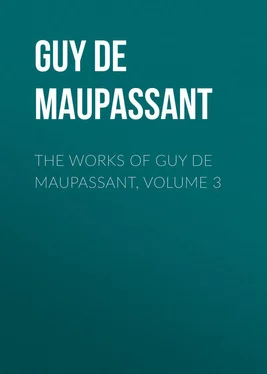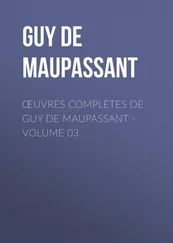Guy Maupassant - The Works of Guy de Maupassant, Volume 3
Здесь есть возможность читать онлайн «Guy Maupassant - The Works of Guy de Maupassant, Volume 3» — ознакомительный отрывок электронной книги совершенно бесплатно, а после прочтения отрывка купить полную версию. В некоторых случаях можно слушать аудио, скачать через торрент в формате fb2 и присутствует краткое содержание. Жанр: literature_19, foreign_antique, foreign_prose, на английском языке. Описание произведения, (предисловие) а так же отзывы посетителей доступны на портале библиотеки ЛибКат.
- Название:The Works of Guy de Maupassant, Volume 3
- Автор:
- Жанр:
- Год:неизвестен
- ISBN:нет данных
- Рейтинг книги:3 / 5. Голосов: 1
-
Избранное:Добавить в избранное
- Отзывы:
-
Ваша оценка:
- 60
- 1
- 2
- 3
- 4
- 5
The Works of Guy de Maupassant, Volume 3: краткое содержание, описание и аннотация
Предлагаем к чтению аннотацию, описание, краткое содержание или предисловие (зависит от того, что написал сам автор книги «The Works of Guy de Maupassant, Volume 3»). Если вы не нашли необходимую информацию о книге — напишите в комментариях, мы постараемся отыскать её.
The Works of Guy de Maupassant, Volume 3 — читать онлайн ознакомительный отрывок
Ниже представлен текст книги, разбитый по страницам. Система сохранения места последней прочитанной страницы, позволяет с удобством читать онлайн бесплатно книгу «The Works of Guy de Maupassant, Volume 3», без необходимости каждый раз заново искать на чём Вы остановились. Поставьте закладку, и сможете в любой момент перейти на страницу, на которой закончили чтение.
Интервал:
Закладка:
Unfortunately, however, they had to do the same thing over again every year, and as if bad luck were continuing to follow them implacably, Madame de Maurillac and her daughter did not succeed in their endeavors, and did not manage during her usual absence from home, to pick up some nice fellow who fell in love immediately, who took them seriously, and asked for Fabienne's hand, consequently, they were very unhappy. Their energies flagged, and their courage left them like water that escapes, drop by drop, through a crack in a jug. They grew low-spirited and no longer dared to be open towards each other and to exchange confidences and projects.
Fabienne, with her pale cheeks, her large eyes with blue circles round them and her tight lips, looked like some captive princess who is tormented by constant ennui, and troubled by evil suggestions; who dreams of flight, and of escape from that prison where fate holds her captive.
One night, when the sky was covered with heavy thunderclouds and the heat was most oppressive, Madame de Maurillac called her daughter whose room was next to hers. After calling her loudly for some time in vain, she sprang out of bed in terror and almost broke open the door with her trembling hands. The room was empty, and the pillows untouched.
Then, nearly mad and foreseeing some irreparable misfortune, the poor woman ran all over the large house, and then rushed out into the garden, where the air was heavy with the scent of flowers. She had the appearance of some wild animal that is being pursued by a pack of hounds, tried to penetrate the darkness with her anxious looks, and gasped as if some one were holding her by the throat; but suddenly she staggered, uttered a painful cry and fell down in a fit.
There before her, in the shadow of the myrtle trees, Fabienne was sitting on the knees of a man – of the gardener – with both her arms round his neck and kissing him ardently, and as if to defy her, and to show her how vain all her precautions and her vigilance had been, the girl was telling her lover in the country dialect, and in a cooing and delightful voice, how she adored him and that she belonged to him…
Madame de Maurillac is in a lunatic asylum, and Fabienne has married the gardener.
What could she have done better?
GHOSTS
Just at the time when the Concordat was in its most flourishing condition, a young man belonging to a wealthy and highly respected middle class family went to the office of the head of the police at P – , and begged for his help and advice, which was immediately promised him.
"My father threatens to disinherit me," the young man then began, "although I have never offended against the laws of the State, of morality or of his paternal authority, merely because I do not share his blind reverence for the Catholic Church and her Ministers. On that account he looks upon me, not merely as Latitudinarian, but as a perfect Atheist, and a faithful old manservant of ours, who is much attached to me, and who accidentally saw my father's will, told me in confidence that he had left all his property to the Jesuits. I think this is highly suspicious, and I fear that the priests have been maligning me to my father. Until less than a year ago, we used to live very quietly and happily together, but ever since he has had so much to do with the clergy, our domestic peace and happiness are at an end."
"What you have told me," the official replied, "is as likely as it is regrettable, but I fail to see how I can interfere in the matter. Your father is in the full possession of all his mental faculties, and can dispose of all his property exactly as he pleases. I also think that your protest is premature; you must wait until his will can legally take effect, and then you can invoke the aid of justice; I am sorry to say that I can do nothing for you."
"I think you will be able to," the young man replied; "for I believe that a very clever piece of deceit is being carried on here."
"How? Please explain yourself more clearly."
"When I remonstrated with him, yesterday evening, he referred to my dead mother, and at last assured me, in a voice of the deepest conviction, that she had frequently appeared to him, and had threatened him with all the torments of the damned, if he did not disinherit his son, who had fallen away from God, and leave all his property to the Church. Now I do not believe in ghosts."
"Neither do I," the police director replied; "but I cannot well do anything on this dangerous ground, if I had nothing but superstitions to go upon. You know how the Church rules all our affairs since the Concordat with Rome, and if I investigate this matter, and obtain no results, I am risking my post. It would be very different if you could adduce any proofs for your suspicions. I do not deny that I should like to see the clerical party, which will, I fear, be the ruin of Austria, receive a staggering blow; try, therefore, to get to the bottom of this business, and then we will talk it over again."
About a month passed, without the young Latitudinarian being heard of; but then he suddenly came one evening, evidently in a great state of excitement, and told him that he was in a position to expose the priestly deceit which he had mentioned, if the authorities would assist him. The police director asked for further information.
"I have obtained a number of important clues," the young man said. "In the first place, my father confessed to me, that my mother did not appear to him in our house, but in the churchyard where she is buried. My mother was consumptive for many years, and a few weeks before her death she went to the village of S – , where she died and was buried. In addition to this, I found out from our footman, that my father has already left the house twice, late at night, in company of X – , the Jesuit priest, and that on both occasions he did not return till morning. Each time he was remarkably uneasy and low-spirited after his return, and had three masses said for my dead mother. He also told me just now, that he has to leave home this evening on business, but immediately he told me that, our footman saw the Jesuit go out of the house. We may, therefore, assume that he intends this evening to consult the spirit of my dead mother again, and this would be an excellent opportunity for getting on the track of the matter, if you do not object to opposing the most powerful force in the Empire, for the sake of such an insignificant individual as myself."
"Every citizen has an equal right to the protection of the State," the police director replied; "and I think that I have shown often enough, that I am not wanting in courage to perform my duty, no matter how serious the consequences may be; but only very young men act without any prospects of success, as they are carried away by their feelings. When you came to me the first time, I was obliged to refuse your request for assistance, but to-day your shares have risen in value. It is now eight o'clock, and I shall expect you in two hours' time, here in my office. At present, all you have to do is to hold your tongue; everything else is my affair."
As soon as it was dark, four men got into a closed carriage in the yard of the police office, and were driven in the direction of the village of S – ; their carriage, however, did not enter the village, but stopped at the edge of a small wood in the immediate neighborhood. Here they all four alighted; they were the police director, accompanied by the young Latitudinarian, a police sergeant and an ordinary policeman, who was, however, dressed in plain clothes.
"The first thing for us to do is to examine the locality carefully," the police director said; "it is eleven o'clock and the exorcisers of ghosts will not arrive before midnight, so we have time to look round us, and to take our measure."
Читать дальшеИнтервал:
Закладка:
Похожие книги на «The Works of Guy de Maupassant, Volume 3»
Представляем Вашему вниманию похожие книги на «The Works of Guy de Maupassant, Volume 3» списком для выбора. Мы отобрали схожую по названию и смыслу литературу в надежде предоставить читателям больше вариантов отыскать новые, интересные, ещё непрочитанные произведения.
Обсуждение, отзывы о книге «The Works of Guy de Maupassant, Volume 3» и просто собственные мнения читателей. Оставьте ваши комментарии, напишите, что Вы думаете о произведении, его смысле или главных героях. Укажите что конкретно понравилось, а что нет, и почему Вы так считаете.












